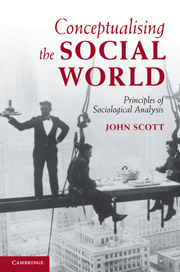Book contents
- Frontmatter
- Contents
- Figures
- 1 Diversity and Continuity in Social Theory
- 2 Culture: the Socialisation of Meaning
- 3 Nature: Conditions and Constraints
- 4 Systemic Processes: Regulation and Control
- 5 Space-Time: Forms and Practices
- 6 Social Structure: Institutions and Relations
- 7 Social Action: Interpersonal and Collective
- 8 Subjects: Socialised Minds
- 9 Social Development: Differentiation and Change
- 10 Conclusion
- Notes
- References
- Index
5 - Space-Time: Forms and Practices
Published online by Cambridge University Press: 05 June 2012
- Frontmatter
- Contents
- Figures
- 1 Diversity and Continuity in Social Theory
- 2 Culture: the Socialisation of Meaning
- 3 Nature: Conditions and Constraints
- 4 Systemic Processes: Regulation and Control
- 5 Space-Time: Forms and Practices
- 6 Social Structure: Institutions and Relations
- 7 Social Action: Interpersonal and Collective
- 8 Subjects: Socialised Minds
- 9 Social Development: Differentiation and Change
- 10 Conclusion
- Notes
- References
- Index
Summary
Space and time – or space-time – are categorical dimensions of understanding (Kant 1781), though Durkheim (1912a) showed them to have a social origin (see also Schmauss 1994; Rawls 2004: ch. 10). Time is central to ideas of historical change and social development (Nisbet 1969). Space is fundamental to ideas of distribution, migration, and placement. Social processes such as industrialisation and urbanisation are described in terms that directly imply both temporal change and spatial location. These are routinely described in terms of their pace and acceleration (Aminzade 1992: 459) and their distribution and location. The articulation of culture and nature occurs over time in relation to the projects, plans, and strategies of agents, and it occurs in the definite places in which they live. Self-regulation in social systems involves flows of resources and information that are monitored over time and across space to provide feedback on current system states and to generate systemic change.
Information
- Type
- Chapter
- Information
- Conceptualising the Social WorldPrinciples of Sociological Analysis, pp. 116 - 143Publisher: Cambridge University PressPrint publication year: 2011
